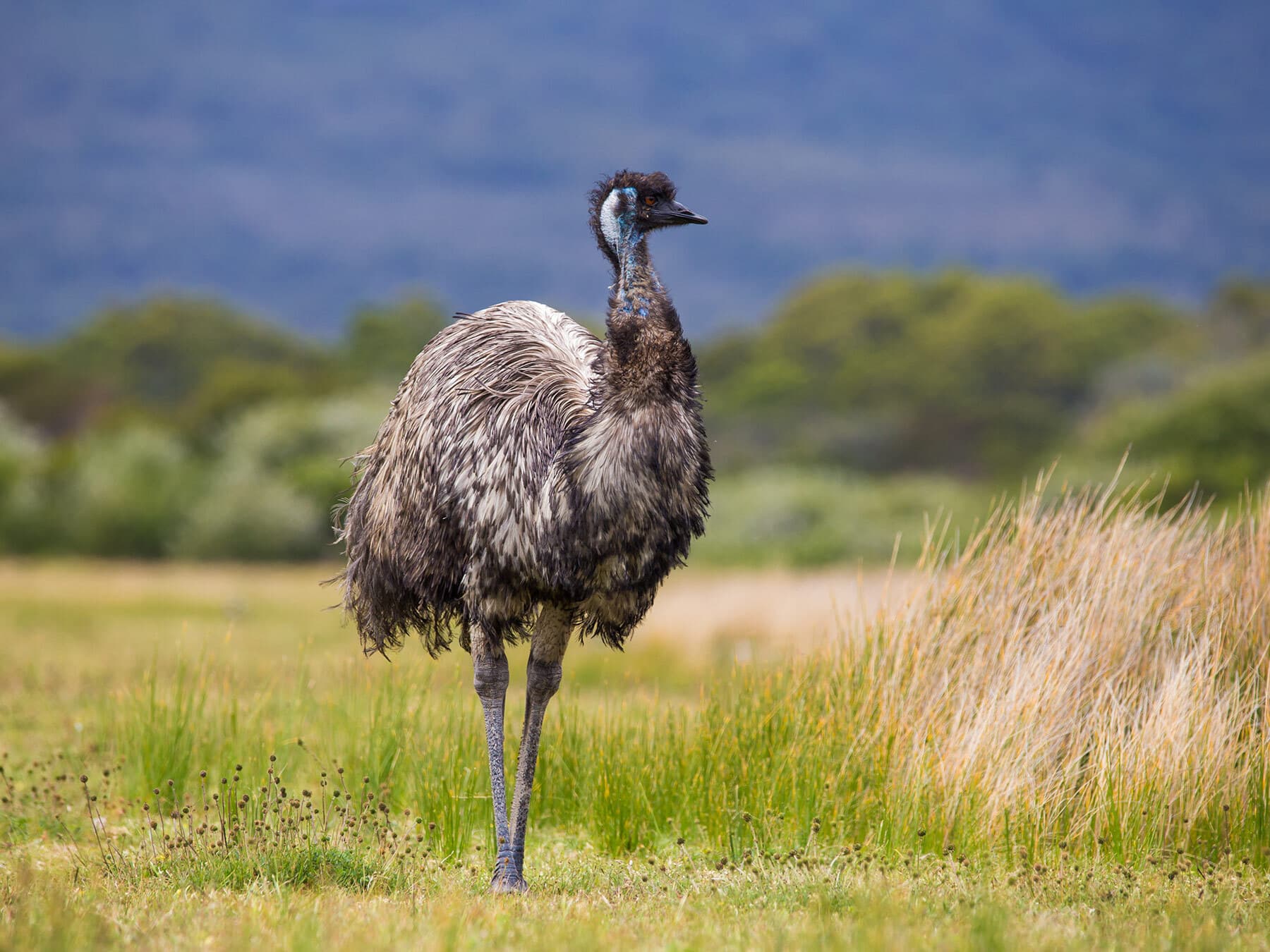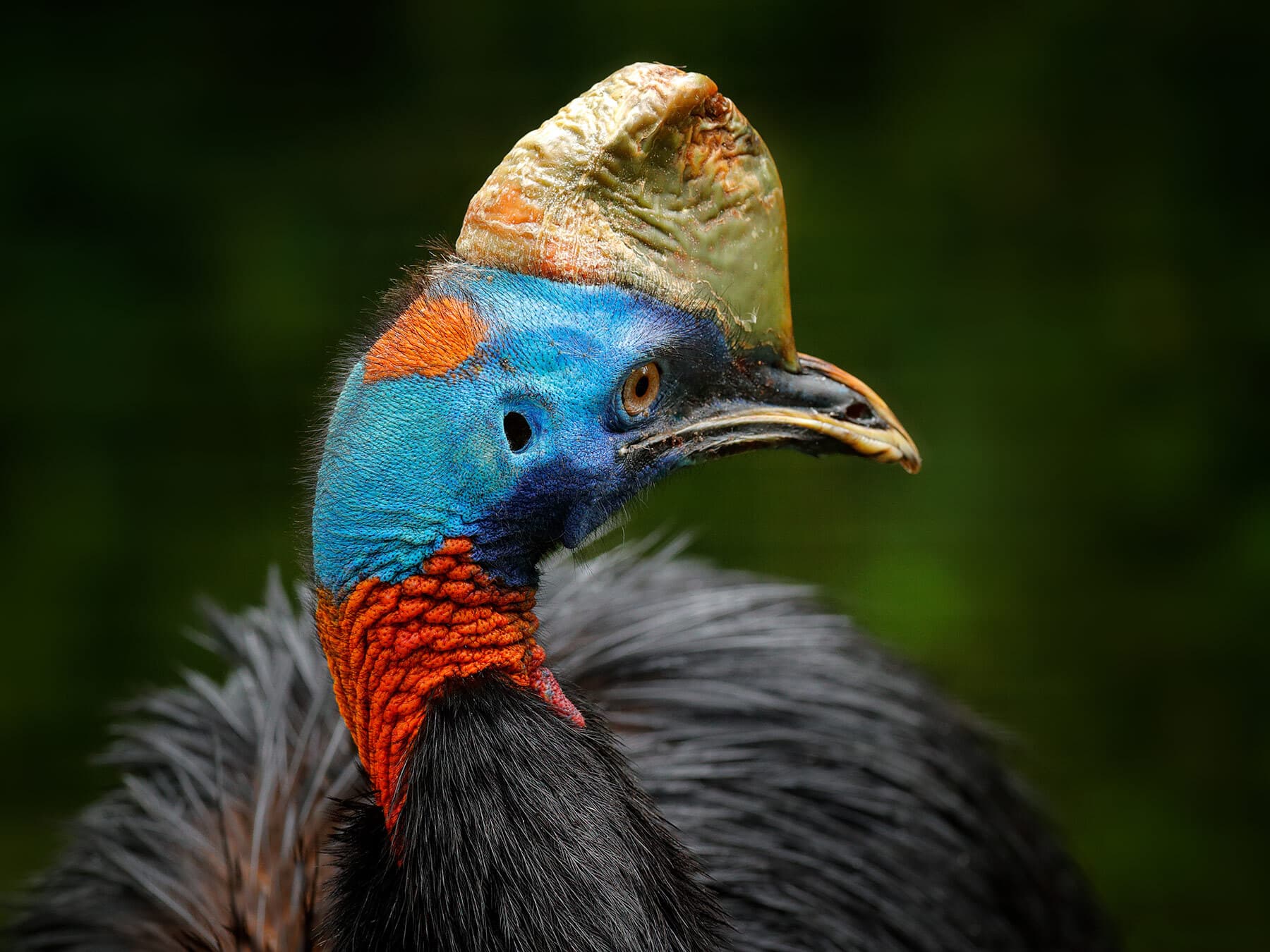
From the Journal
What Do Cassowaries Eat? (Full Diet, Habits and Behavior)
The world’s third-heaviest bird, after the ostrich and the emu, the southern cassowary is distinctive in its appearance, its dietary choices, and the unique impact its foraging and feasting has on the tropical rainforests it inhabits. But what do cassowaries eat and how much food do these flightless giants need each day? Read on to find out!
With their reptilian appearance, you might assume that cassowaries are predatory hunters with a carnivorous diet. But, perhaps surprisingly, it is actually fruit that forms the bulk of the diet of these giant “rainforest dinosaurs.”
There are three subspecies of cassowary:
- Southern cassowary, the most common cassowary, found in north-eastern Australia, New Guinea and parts of Indonesia,
- Dwarf cassowary, the smallest cassowary, native to central New Guinea,
- Northern cassowary, native to northern New Guinea.
Although the three species are distinct and resident in different geographical locations, they share many characteristics and similarities when it comes to diet, foraging methods, and food preferences.
So read on to find out more about the dietary preferences of cassowaries and the vital role these flightless giants play in dispersing fruit seeds throughout the rainforest.
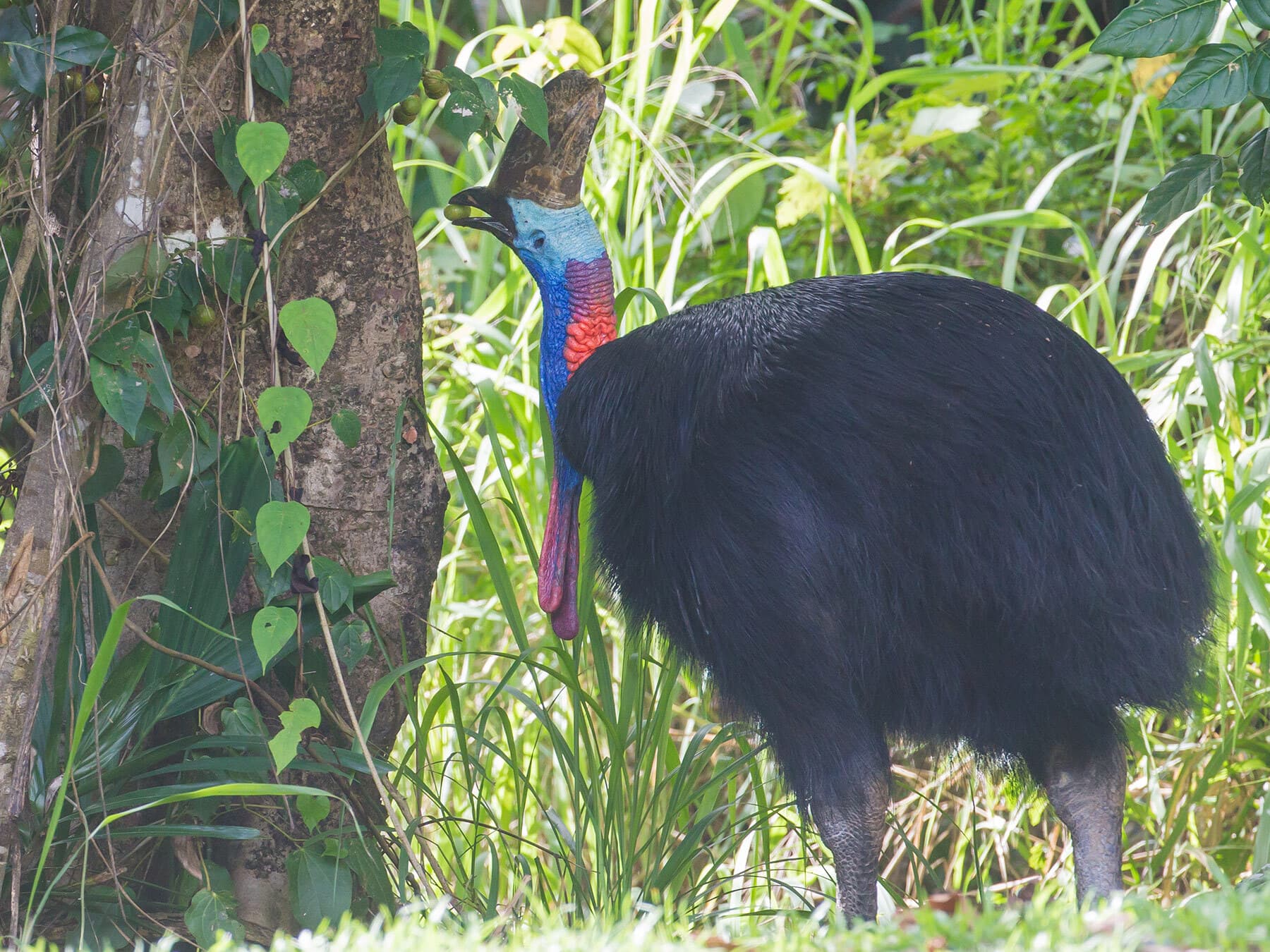
What do cassowaries eat in the wild?
All subspecies of cassowary are primarily fruit eaters. Around 90 percent of a cassowary’s diet consists of fleshy fruits and berries that they forage from the rainforest floor.
If fresh fruit is ever in short supply, cassowaries will supplement their diet with the following:
- Fungi
- Small rodents (mice, rats)
- Frogs
- Snakes and lizards
- Small birds and their eggs
- Fish
- Insects
- Snails
- Carrion
What do cassowaries eat in captivity?
In captivity, cassowaries are fed a diet that aims to mimic their natural diet as closely as possible, with large quantities of different types of fruit being supplemented by protein, vitamins, and minerals.
Occasionally alternative foods are offered, including vegetables (peas, sweet potato, and carrot), as well as worms, and insects.
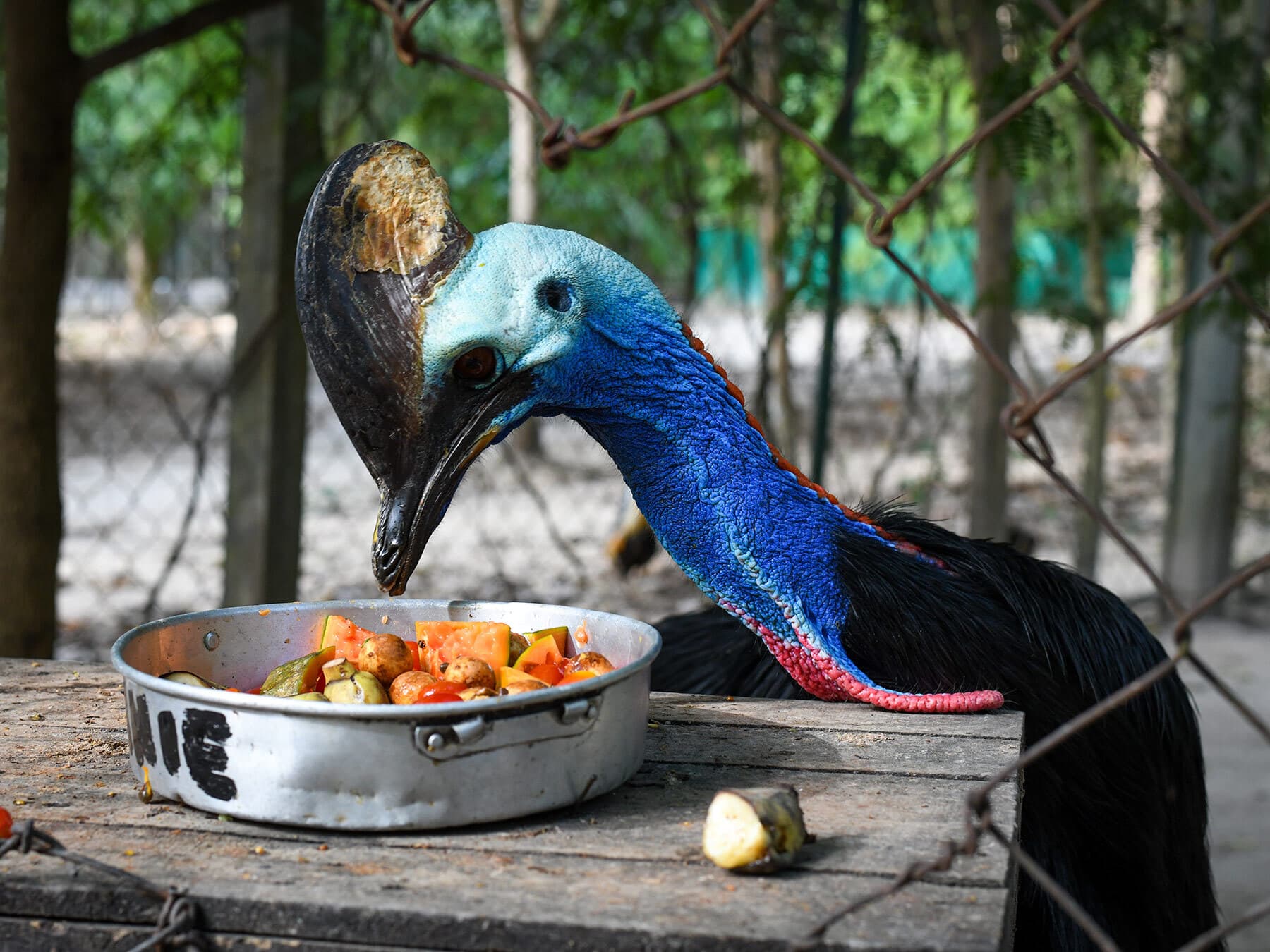
What fruit does the cassowary eat?
Much of the information that we have about cassowaries’ dietary preferences comes from studying their dung. One such examination revealed that southern cassowaries eat fruit from at least 238 species of plant, with fruits of the quandong, laurel, and podocarp families being the most significant.
Regarded as a “keystone species”, cassowaries play a vital role in the dispersal of seeds throughout the rainforest, with seeds swallowed whole and deposited intact and fully undigested through the birds’ dung as they roam across their territories.
How often do cassowaries eat?
Cassowaries need to eat regularly, as food passes relatively quickly through their digestive tracts. They often need to eat large quantities of food, equivalent to up to 10 percent of their body weight, but their appetite and food consumption can vary throughout the year, from around 1kg to up to 15 kg (2-33 lb) in a single day.
Got a photo of a bird you can't identify?
Upload a photo and find out what it is in seconds — no account needed
Identify a Bird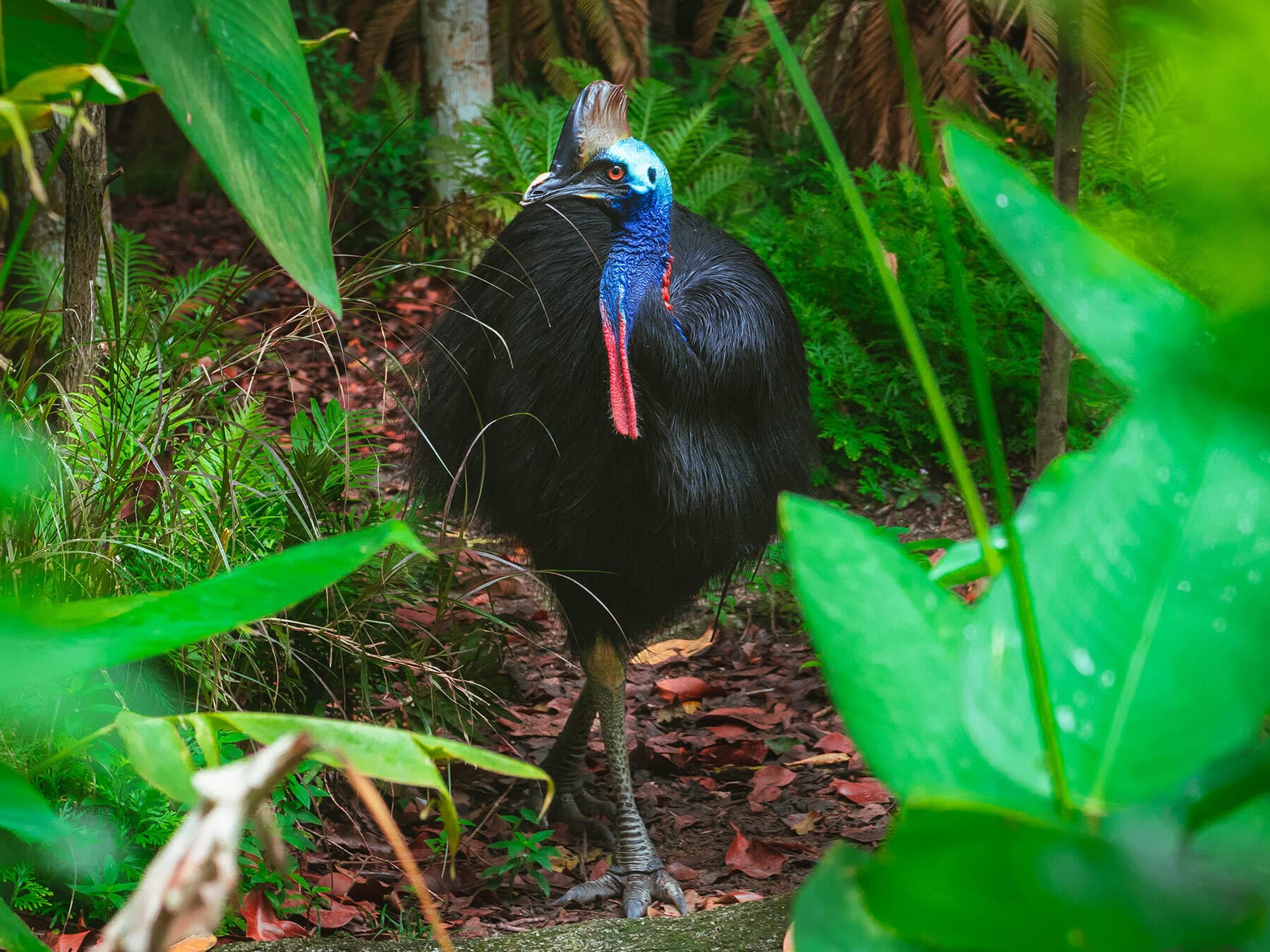
How do cassowaries find food?
The natural habitat of cassowaries is rainforests, and they find food by foraging on the forest floor for fallen fruit. Occasionally fruit and seeds will be eaten directly from low-growing living plants. Cassowaries have also been observed to jump several feet to reach fruit that is still on trees.
Cassowaries use their bony head crests as a tool to search through leaves and foliage on the rainforest floor to find edible fruits and plant parts.
Solitary birds, cassowaries mostly feed alone, guarding the area around a particular tree until they have exhausted the fallen fruit beneath it. They occasionally feed in pairs or small groups; larger groups have been observed to gather together at spots where food resources are particularly abundant.
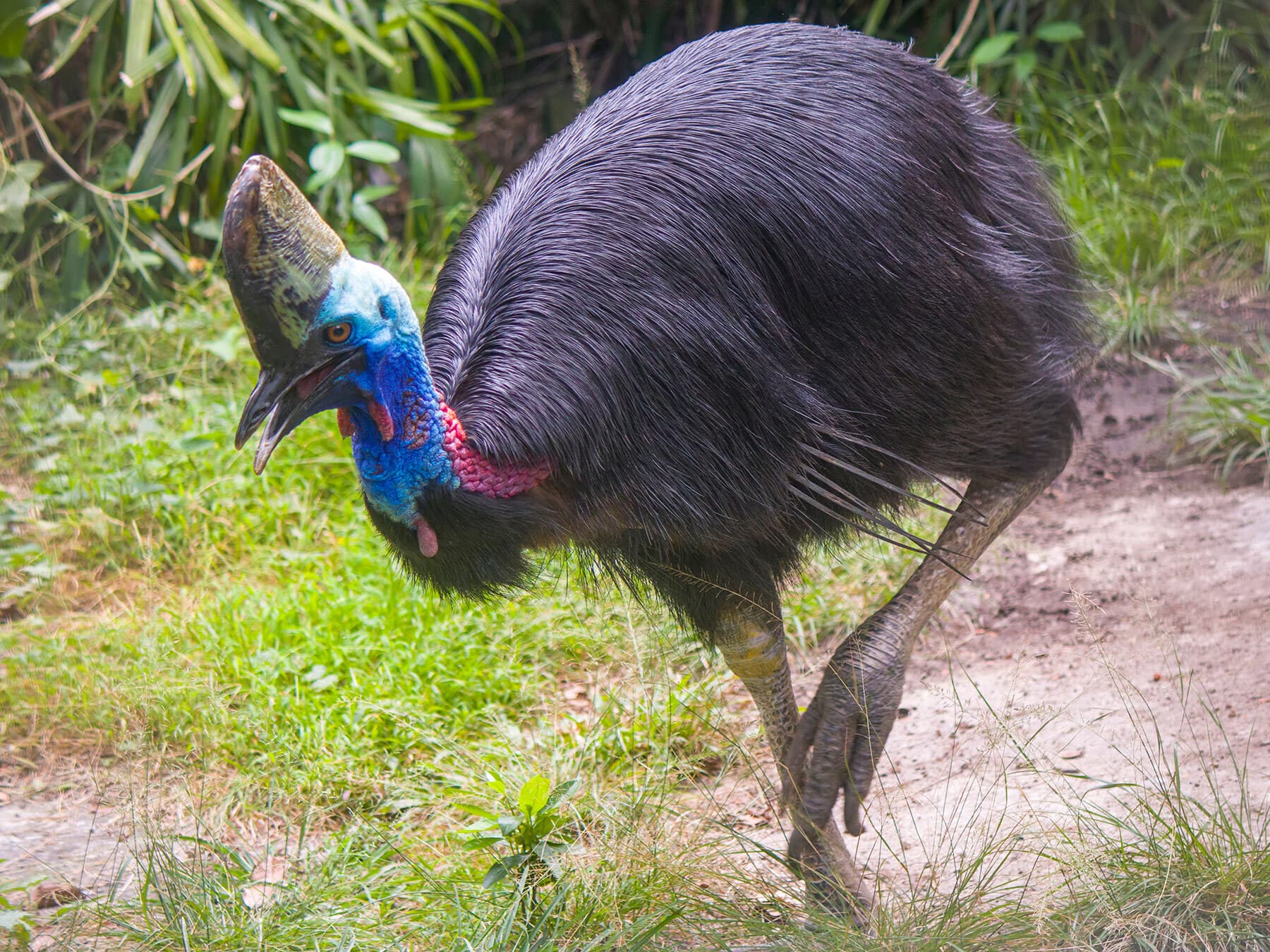
What time of day do cassowaries feed?
Cassowaries have adapted their daily feeding habits to suit the tropical climates in which they live. Feeding takes place early in the morning and again in the early evening. During the hottest part of the day – late morning and early afternoon – they find shady spots under shelter of the rainforest canopy to rest in.
What do cassowaries eat in the winter?
Cassowaries are not fussy at all about what fruits they eat, and their diet includes such a wide range of fruits, there are always plenty of options available, regardless of the season.
Winter, the season when fruit supplies are at their leanest, coincides with the beginning of the incubation period, when males remain on the nest for up to two months without eating, as they do not risk leaving their unhatched eggs unattended.
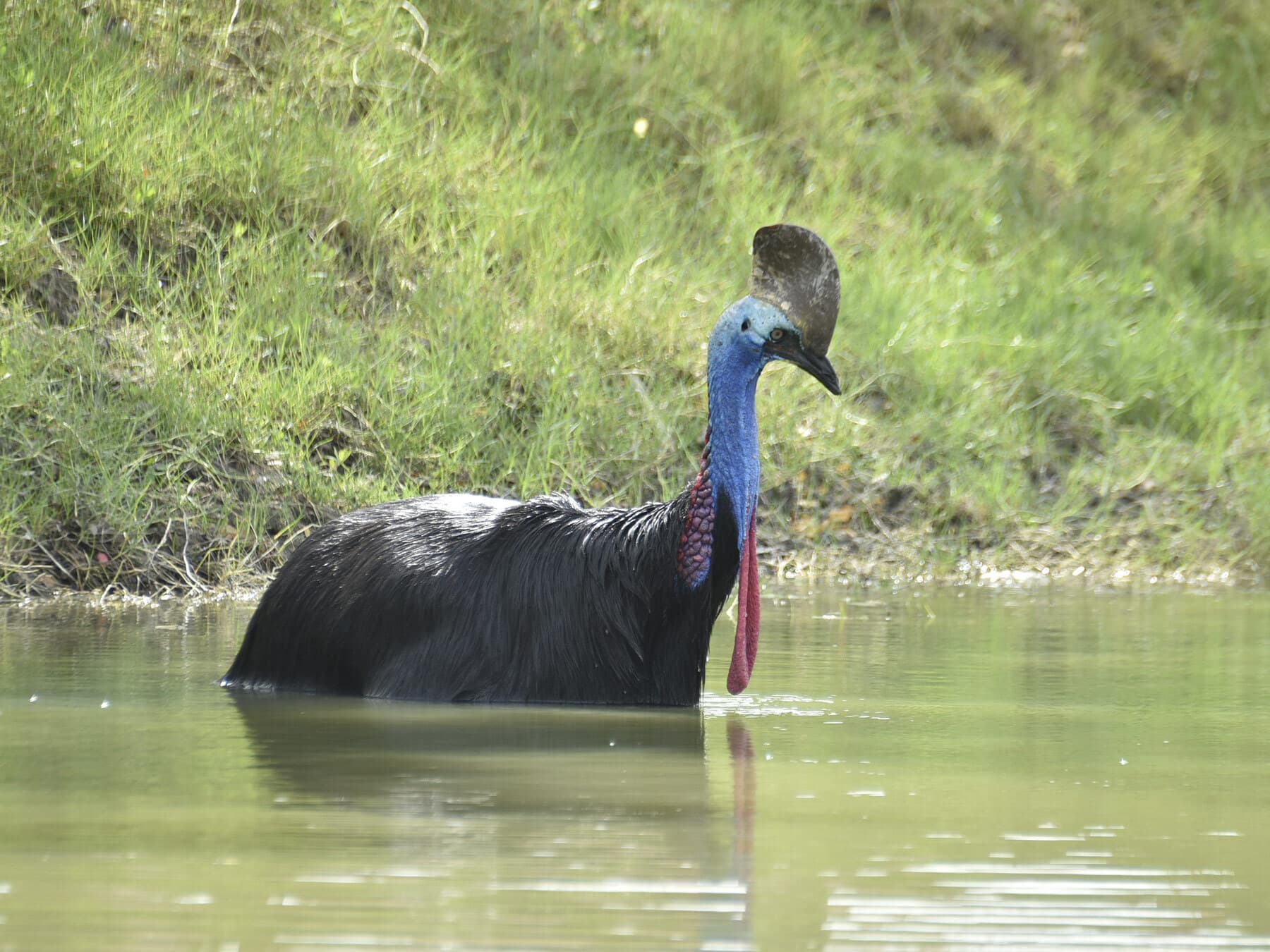
What do cassowaries eat in the summer?
In summer, a wider variety of fruit is available in the cassowary’s native rainforest habitat. During this time of year, they tend to forage more near trees that provide annual, seasonal fruits rather than ones that continuously bear fruit all year round.
What do baby cassowaries eat?
Baby cassowaries leave the nest within hours of hatching, and quickly master the art of foraging for fruit on the rainforest floor, under the watchful eye of the father.
In captivity, juvenile cassowaries require extra protein supplements, to support their rapid growth during the first few months of their life.
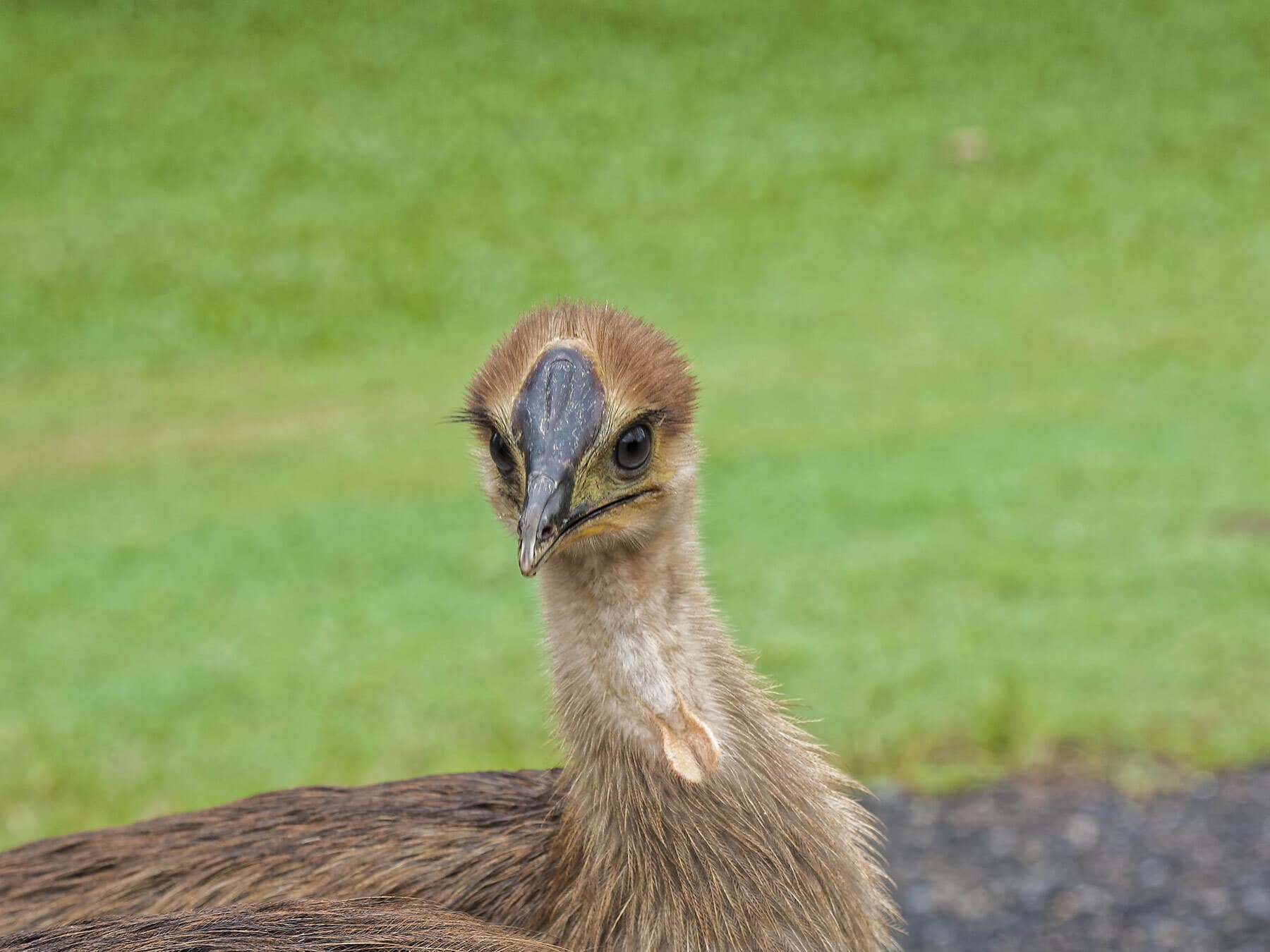
What can I feed cassowaries?
You should never attempt to feed a cassowary, due to their aggressive and unpredictable nature and their tendency to attack humans that they encounter.
Cassowaries have a reputation as being “the world’s most dangerous bird” and should never be approached in the wild, and even in captivity, their keepers do not take any risks by entering their enclosures.
The most appropriate advice is to leave cassowaries to find their own food rather than providing food for them. Feeding cassowaries poses the risk of them becoming reliant on humans for food, which may lead to health issues and increase the chance of attacks on other people, if they think that every human is a source of food.
What do cassowaries drink?
During the dry season, cassowaries visit watering holes in search of water to drink. They drink water from streams, pools, and other rainforest watercourses.
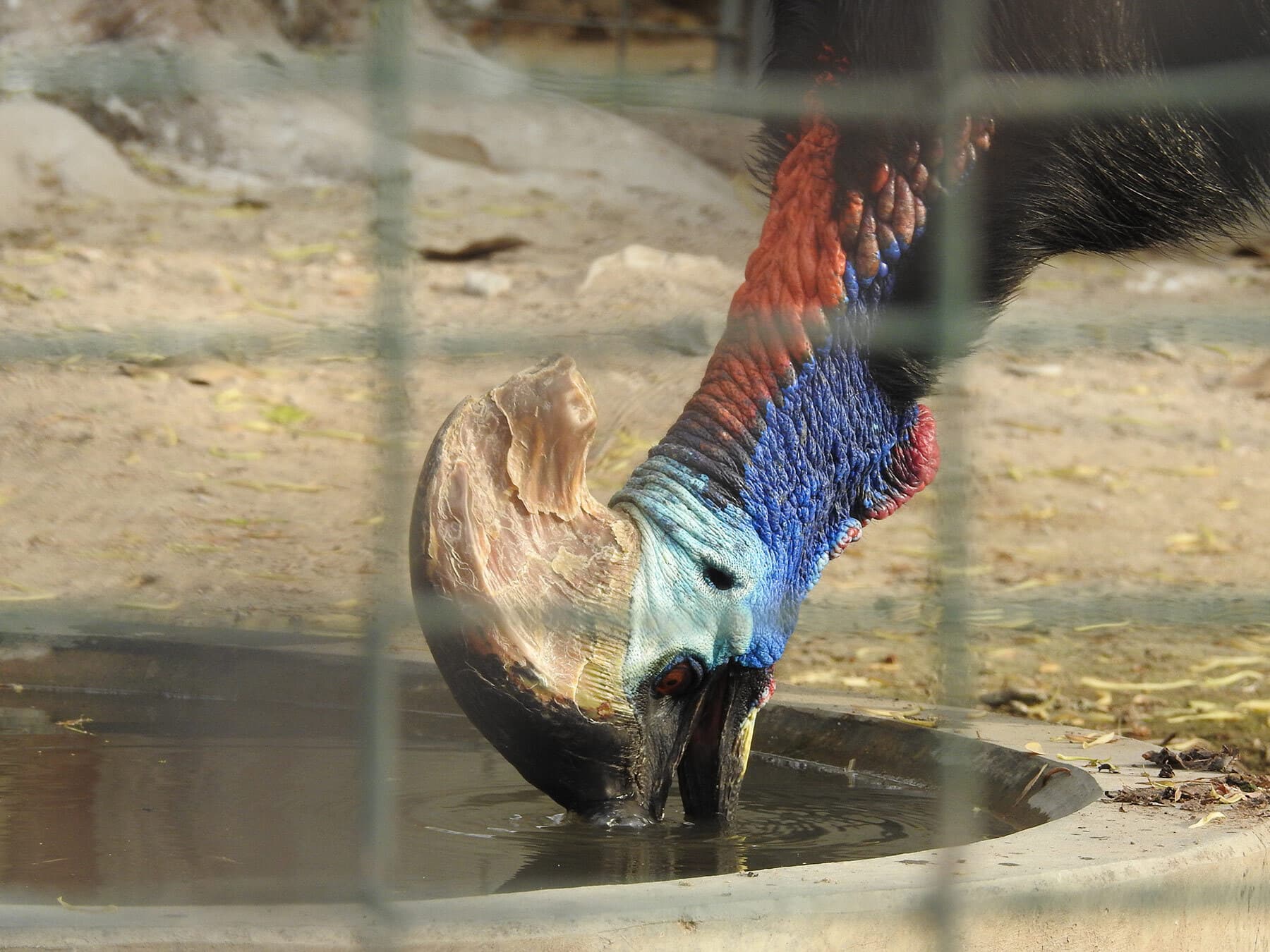
How do cassowaries drink water?
Cassowaries drink by lowering their head to the water, scooping with their lower bill, and then tipping their head back to swallow. They have been observed to drink from both sitting and standing positions.
Are cassowaries omnivores?
Cassowaries are classified as omnivores despite fruit representing by far the most significant share of their diet. Occasionally they will eat frogs, birds, mice, rats, and other small animals that they encounter while foraging for food in the rainforest floor.
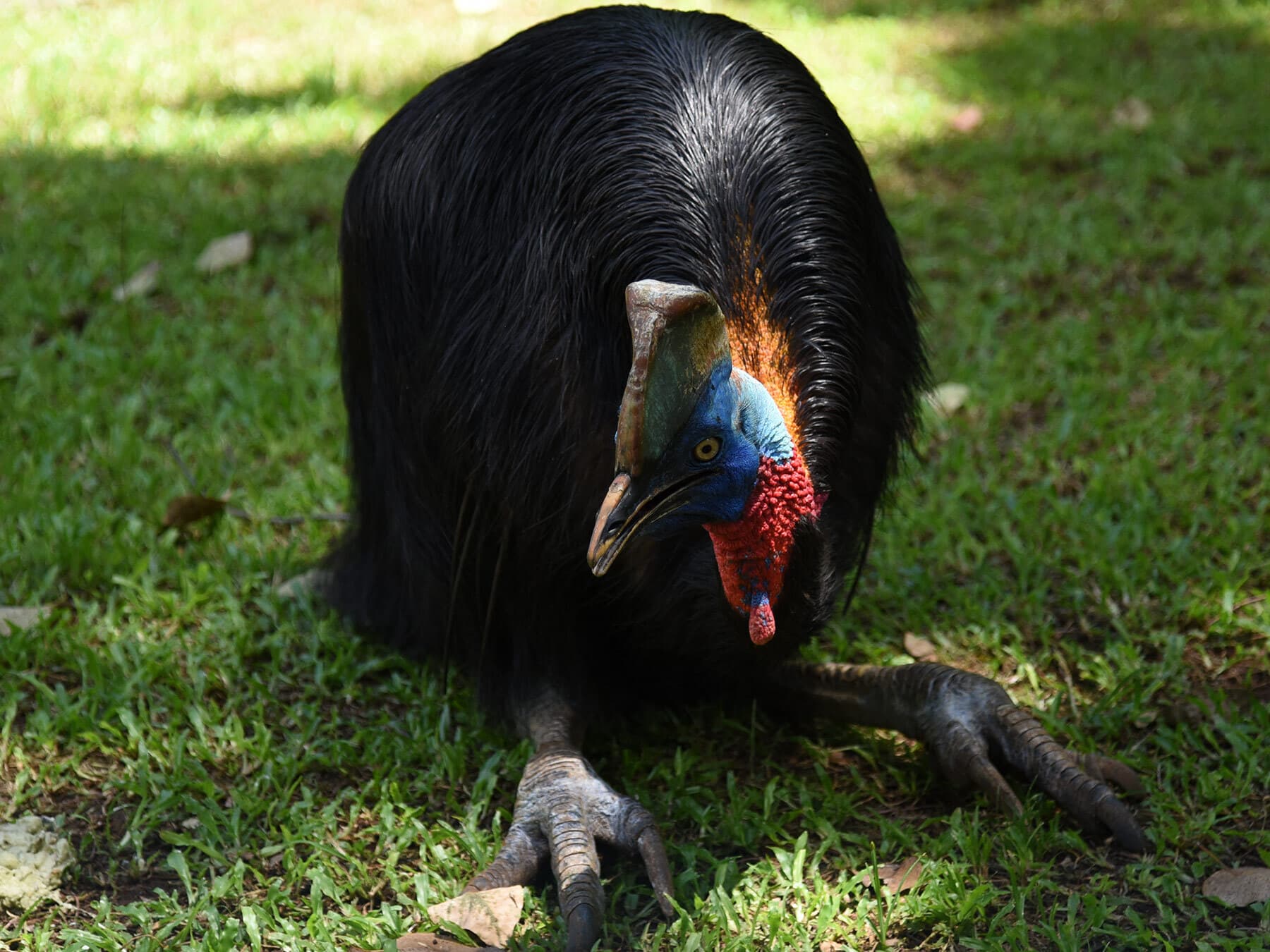
Cassowary Diet FAQs
Do cassowaries eat meat?
Meat does not form a significant part of the cassowary’s diet. However, occasionally they will eat birds, frogs, fish, small rodents, and even carrion that they come across in their natural rainforest environments.
Do cassowary eat humans?
Cassowaries do not eat humans, but have been known to attack people, causing major injuries and even in some occasions, death. The motive for these attacks is not food-related, however. Cassowaries are highly territorial birds and are likely to attack humans if they feel their young or home turf is under threat.
Do cassowaries eat snakes?
When fruit supplies are particularly scarce, cassowaries will turn elsewhere for food, and this may on occasions include small snakes.
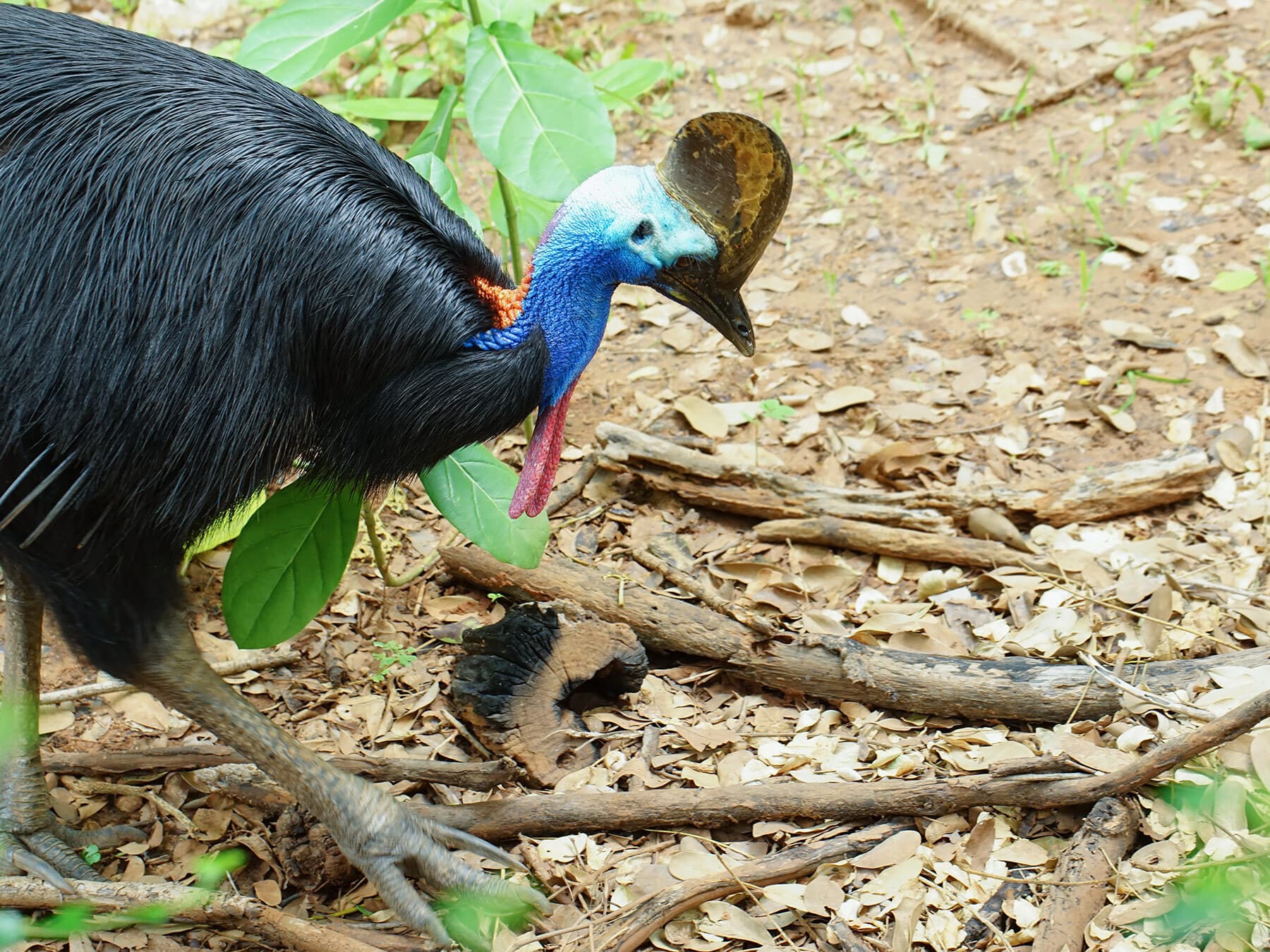
Do cassowaries eat rocks?
Cassowaries do not eat rocks or grit; however, they do swallow whole fruits, which have seeds as large as golf balls. While some seed-eating birds need to swallow grit to help them digest fruit seeds, cassowaries have no problem in stripping the flesh from the fruit they eat and then moving the seeds through their digestive systems untouched.
Do cassowaries eat birds?
Cassowaries will sometimes eat small birds and birds’ eggs, but neither is a key component of their diet.
Do cassowaries eat fish?
Fish aren’t a major part of a cassowary’s diet, but they are opportunistic foragers and will eat them when they come across them in rainforest streams.
Identify Any Bird Instantly
- Upload a photo from your phone or camera
- Get an instant AI identification
- Ask follow-up questions about the bird
Monthly Birds in Your Area
- Personalised for your location
- Seasonal tips and garden advice
- Updated every month with new species
